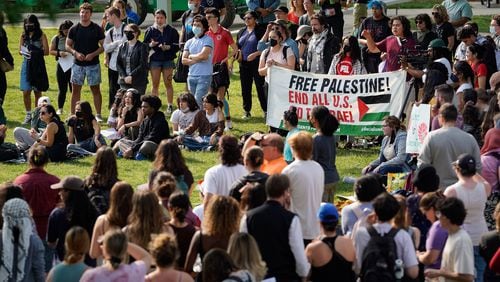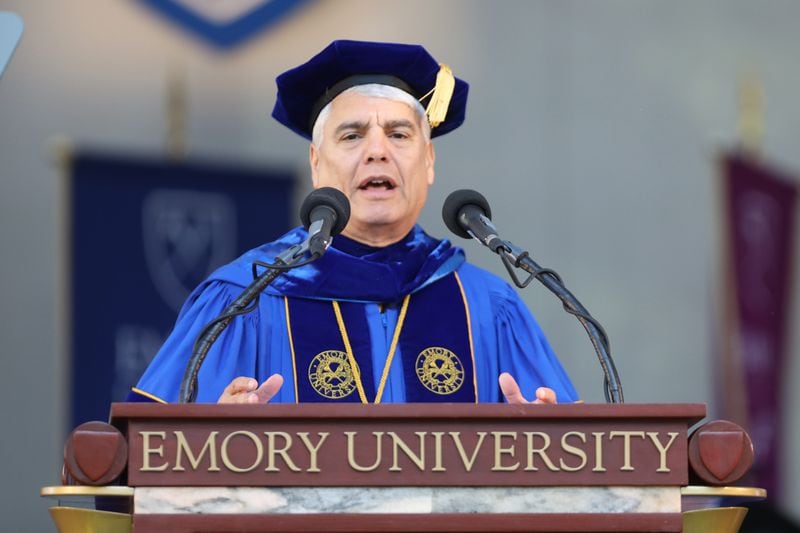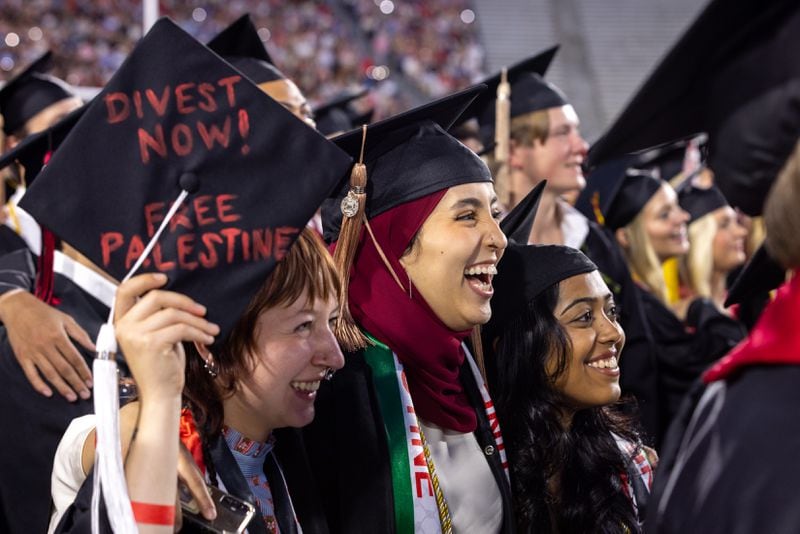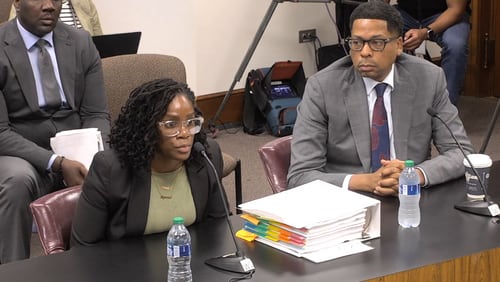As community members at Emory University gathered by the hundreds on a Friday afternoon to rally in support of Palestinians and rebuke the chaotic clearing of a protest the day prior, more familiar scenes took place on the margins of the quad.
Groups of students dressed in white posed for photos with their academic regalia and bottles of Champagne, commemorating the upcoming milestone of graduation. Just two weeks later, they and other seniors expected to sit on that lawn, greet luminaries, receive their diplomas and celebrate with friends and family. The arched frame that would shade the stage was already set up in front of Convocation Hall.
Commencement, however, will play out differently on Monday, with ceremonies being held instead at the indoor Gas South Arena about 20 miles away in Duluth.
Those ceremonies will mark the official end of an academic year upended over the past two and half weeks by demonstrations over the war in Gaza, including a controversial decision by the university last month to have police break up a pro-Palestinian encampment on the quad.
Looming questions
Emory President Gregory L. Fenves has participated in several online meetings with community members to discuss his decision to clear the encampment, criticism of police use of force and where he stands regarding demands to divest from Israel as well as the planned Atlanta Public Training Center.
Fenves told students in an online meeting Tuesday, “I am not considering, and I don’t support Emory divesting from Israel,” according to a transcript posted by the University Senate.
Fenves also told students the training facility is not an Emory issue: “That’s a City of Atlanta decision by the elected leaders of the City of Atlanta. And Emory doesn’t have a position.”
Credit: Miguel Martinez
Credit: Miguel Martinez
The faculty of the College of Arts and Sciences and Oxford College each voted no confidence in Fenves, as did undergraduate students who participated in a similar vote. About 3,400 of Emory’s 8,100 undergraduate students voted, and 73% supported the no confidence motion. Emory issued a response pointing out that represents 31% of undergraduate students.
A coalition of groups calling for divestment announced on social media Thursday a series of demands sent to the board of trustees related to transparency of Emory’s finances, saying, “we refuse to have our tuition money fund genocide, apartheid, police or state violence.”
The groups have continued gathering on campus for informational and solidarity events. They also demanded a response from trustees by Sunday.
Faculty support
Maysam Elghazali, a member of Students for Justice in Palestine, said professors have supported students academically amid challenging times on campus.
“They have been granting accommodation and … either canceling finals or extending deadlines for finals or just making finals generally easier for their students,” Elghazali, a rising junior, said. “I’m extremely thankful for my professors, and all the faculty at Emory University, that are taking these measures to actually accommodate to their students that have been impacted by everything going on.”
Professors have also been visible at demonstrations, some with signs taped to their shirts reading, “hands off our students.”
Philosophy Department Chair Noëlle McAfee called the clearing of the encampment “very traumatic” and said simply replacing the president would not resolve issues at Emory.
“We need to be very clear that we are here standing with our students,” McAfee said a day after she was detained and ticketed as police cleared the encampment and dispersed protesters. She said the university over the past year clamped down on student dissent and has attempted to delegitimize student concerns and speech related to Gaza and the police training center.
“Ultimately the board of trustees hires the president, so we need a board of trustees that really understands the gravity of this situation,” McAfee said. “It can’t just be another president coming in with big plans.”
The board is made up of 38 members, many of whom attended Emory and have careers in business, finance, law or the United Methodist Church.
Trustees contacted by The Atlanta Journal-Constitution did not return calls or declined to comment.
More demonstrations?
While announcing the decision to move commencement, Fenves called this year’s graduates “a class like no other.”
“For many of you, the pandemic interrupted your high school graduations, and you began your Emory experience online,” Fenves said. He also assured students the university community would celebrate “your dedication, your accomplishments and your resilience.”
Fenves said safety concerns and recommendations by law enforcement and security agencies informed the decision to move graduation-related ceremonies indoors to the complex.
Emory is one of only a few universities nationwide to take a major action like changing venues. Notably, the University of Southern California and Columbia University altogether canceled university wide commencement ceremonies.
Credit: arvin.temkar@ajc.com
Credit: arvin.temkar@ajc.com
Georgia State, Georgia Tech, Kennesaw State and the University of Georgia have all seen some form of demonstration in recent months, but none adjusted commencement plans.
Ceremonies at those schools have maintained celebratory airs, highlighted by moments like Georgia Tech’s first Black graduate presenting his granddaughter with her master’s degree.
Commencements have also provided a platform — usually just a few seconds as they cross the stage on camera — for students to show support for causes. Graduates across the country have indicated support for Palestinians by decorating their caps, unveiling flags or flashing a message on their phone screens.
One Georgia State graduate student went viral online as video captured her crossing the graduation stage draped in a kaffiyeh and shouting to the audience, drawing applause and cheers. University spokeswoman Andrea Jones said the student was later escorted out because she walked in front of the stage, unrolled a Palestinian flag and started shouting.
At the University of Georgia Friday, demonstrators gathered near the stadium before commencement carrying protest signs and distributing items in the colors of the Palestinian flag. One student wrote, “Divest now, free Palestine,” on her cap.
Emory’s informational page about commencement notes its open expression policy will be in effect. It also lists rules from Gas South, including prohibited items like balloons, signs and most bags. The arena’s code of conduct states: “Guests will enjoy every event free from disruptive behavior, including foul or abusive language or obscene gestures.”
Staff writers Shaddi Abusaid, Cassidy Alexander, Martha Dalton and Fletcher Page contributed to this report.









